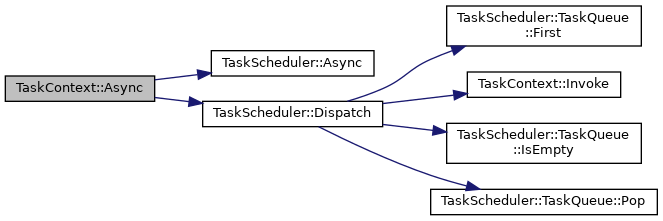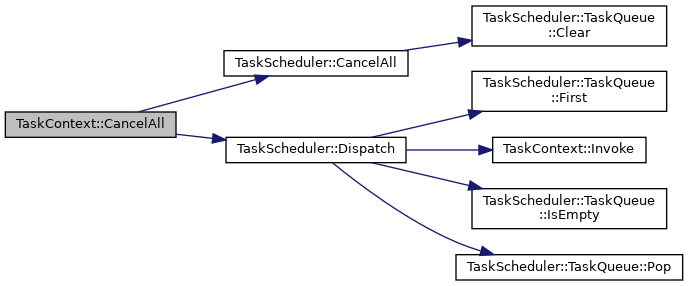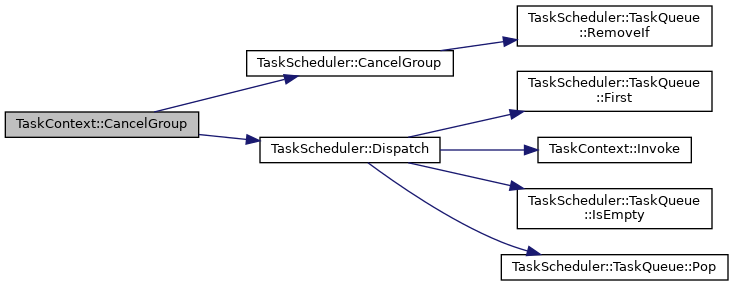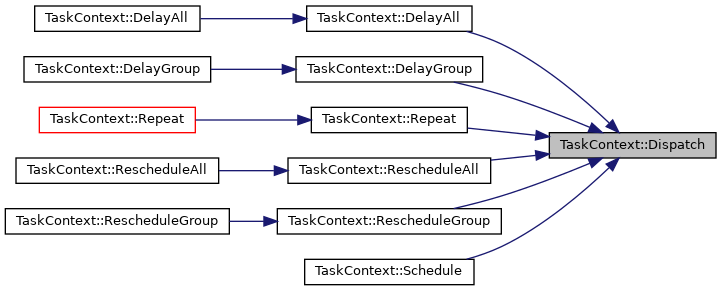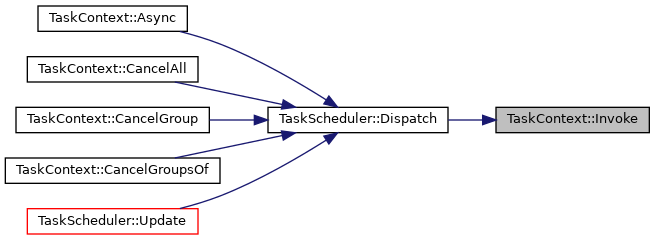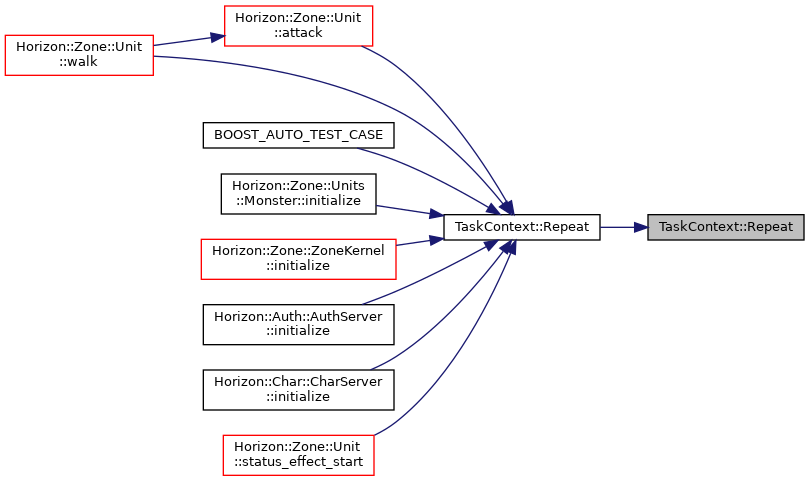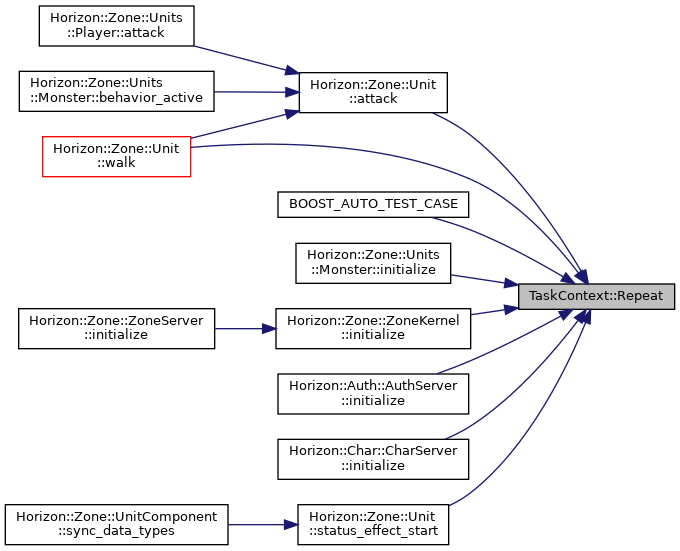#include <TaskScheduler.hpp>
Public Member Functions | |
| TaskContext () | |
| TaskContext (TaskScheduler::TaskContainer &&task, std::weak_ptr< TaskScheduler > &&owner) | |
| TaskContext (TaskContext &&right) | |
| TaskContext & | operator= (TaskContext &&right) |
| bool | IsExpired () const |
| Returns true if the owner was deallocated and this context has expired. More... | |
| bool | IsInGroup (TaskScheduler::group_t const group) const |
| Returns true if the event is in the given group. More... | |
| TaskContext & | SetGroup (TaskScheduler::group_t const group) |
| Sets the event in the given group. More... | |
| TaskContext & | ClearGroup () |
| Removes the group from the event. More... | |
| TaskScheduler::repeated_t | GetRepeatCounter () const |
| Returns the repeat counter which increases every time the task is repeated. More... | |
| template<typename _Rep , typename _Period > | |
| TaskContext & | Repeat (std::chrono::duration< _Rep, _Period > const &duration) |
| Repeats the event and sets a new duration. std::chrono::seconds(5) for example. This will consume the task context, its not possible to repeat the task again from the same task context! More... | |
| TaskContext & | Repeat () |
| Repeats the event with the same duration. This will consume the task context, its not possible to repeat the task again from the same task context! More... | |
| template<typename _RepLeft , typename _PeriodLeft , typename _RepRight , typename _PeriodRight > | |
| TaskContext & | Repeat (std::chrono::duration< _RepLeft, _PeriodLeft > const &min, std::chrono::duration< _RepRight, _PeriodRight > const &max) |
| Repeats the event and set a new duration that is randomized between min and max. std::chrono::seconds(5) for example. This will consume the task context, its not possible to repeat the task again from the same task context! More... | |
| TaskContext & | Async (std::function< void()> const &callable) |
| Schedule a callable function that is executed at the next update tick from within the context. Its safe to modify the TaskScheduler from within the callable. More... | |
| template<typename _Rep , typename _Period > | |
| TaskContext & | Schedule (std::chrono::duration< _Rep, _Period > const &time, TaskScheduler::task_handler_t const &task) |
| Schedule an event with a fixed rate from within the context. Its possible that the new event is executed immediately! Use TaskScheduler::Async to create a task which will be called at the next update tick. More... | |
| template<typename _Rep , typename _Period > | |
| TaskContext & | Schedule (std::chrono::duration< _Rep, _Period > const &time, TaskScheduler::group_t const group, TaskScheduler::task_handler_t const &task) |
| Schedule an event with a fixed rate from within the context. Its possible that the new event is executed immediately! Use TaskScheduler::Async to create a task which will be called at the next update tick. More... | |
| template<typename _RepLeft , typename _PeriodLeft , typename _RepRight , typename _PeriodRight > | |
| TaskContext & | Schedule (std::chrono::duration< _RepLeft, _PeriodLeft > const &min, std::chrono::duration< _RepRight, _PeriodRight > const &max, TaskScheduler::task_handler_t const &task) |
| Schedule an event with a randomized rate between min and max rate from within the context. Its possible that the new event is executed immediately! Use TaskScheduler::Async to create a task which will be called at the next update tick. More... | |
| template<typename _RepLeft , typename _PeriodLeft , typename _RepRight , typename _PeriodRight > | |
| TaskContext & | Schedule (std::chrono::duration< _RepLeft, _PeriodLeft > const &min, std::chrono::duration< _RepRight, _PeriodRight > const &max, TaskScheduler::group_t const group, TaskScheduler::task_handler_t const &task) |
| Schedule an event with a randomized rate between min and max rate from within the context. Its possible that the new event is executed immediately! Use TaskScheduler::Async to create a task which will be called at the next update tick. More... | |
| TaskContext & | CancelAll () |
| Cancels all tasks from within the context. More... | |
| TaskContext & | CancelGroup (TaskScheduler::group_t const group) |
| Cancel all tasks of a single group from within the context. More... | |
| TaskContext & | CancelGroupsOf (std::vector< TaskScheduler::group_t > const &groups) |
| Cancels all groups in the given std::vector from within the context. Hint: Use std::initializer_list for this: "{1, 2, 3, 4}". More... | |
| template<typename _Rep , typename _Period > | |
| TaskContext & | DelayAll (std::chrono::duration< _Rep, _Period > const &duration) |
| Delays all tasks with the given duration from within the context. More... | |
| template<typename _RepLeft , typename _PeriodLeft , typename _RepRight , typename _PeriodRight > | |
| TaskContext & | DelayAll (std::chrono::duration< _RepLeft, _PeriodLeft > const &min, std::chrono::duration< _RepRight, _PeriodRight > const &max) |
| Delays all tasks with a random duration between min and max from within the context. More... | |
| template<typename _Rep , typename _Period > | |
| TaskContext & | DelayGroup (TaskScheduler::group_t const group, std::chrono::duration< _Rep, _Period > const &duration) |
| Delays all tasks of a group with the given duration from within the context. More... | |
| template<typename _RepLeft , typename _PeriodLeft , typename _RepRight , typename _PeriodRight > | |
| TaskContext & | DelayGroup (TaskScheduler::group_t const group, std::chrono::duration< _RepLeft, _PeriodLeft > const &min, std::chrono::duration< _RepRight, _PeriodRight > const &max) |
| Delays all tasks of a group with a random duration between min and max from within the context. More... | |
| template<typename _Rep , typename _Period > | |
| TaskContext & | RescheduleAll (std::chrono::duration< _Rep, _Period > const &duration) |
| Reschedule all tasks with the given duration. More... | |
| template<typename _RepLeft , typename _PeriodLeft , typename _RepRight , typename _PeriodRight > | |
| TaskContext & | RescheduleAll (std::chrono::duration< _RepLeft, _PeriodLeft > const &min, std::chrono::duration< _RepRight, _PeriodRight > const &max) |
| Reschedule all tasks with a random duration between min and max. More... | |
| template<typename _Rep , typename _Period > | |
| TaskContext & | RescheduleGroup (TaskScheduler::group_t const group, std::chrono::duration< _Rep, _Period > const &duration) |
| Reschedule all tasks of a group with the given duration. More... | |
| template<typename _RepLeft , typename _PeriodLeft , typename _RepRight , typename _PeriodRight > | |
| TaskContext & | RescheduleGroup (TaskScheduler::group_t const group, std::chrono::duration< _RepLeft, _PeriodLeft > const &min, std::chrono::duration< _RepRight, _PeriodRight > const &max) |
| Reschedule all tasks of a group with a random duration between min and max. More... | |
Private Member Functions | |
| TaskContext & | Dispatch (std::function< TaskScheduler &(TaskScheduler &)> const &apply) |
| Dispatches an action safe on the TaskScheduler. More... | |
| TaskContext & | operator= (TaskContext const &right) |
| TaskContext (TaskContext const &right) | |
| void | ThrowOnConsumed () const |
| Throws std::logic_error if the task was consumed already. More... | |
| void | Invoke () |
| Invokes the associated hook of the task. More... | |
Private Attributes | |
| TaskScheduler::TaskContainer | _task |
| Associated task. More... | |
| std::weak_ptr< TaskScheduler > | _owner |
| Owner. More... | |
| std::shared_ptr< bool > | _consumed |
| Marks the task as consumed. More... | |
Friends | |
| class | TaskScheduler |
Constructor & Destructor Documentation
◆ TaskContext() [1/4]
|
inlineprivate |
◆ TaskContext() [2/4]
|
inline |
◆ TaskContext() [3/4]
|
inlineexplicit |
◆ TaskContext() [4/4]
|
inline |
Member Function Documentation
◆ Async()
| TaskContext & TaskContext::Async | ( | std::function< void()> const & | callable | ) |
Schedule a callable function that is executed at the next update tick from within the context. Its safe to modify the TaskScheduler from within the callable.
References TaskScheduler::Async(), and TaskScheduler::Dispatch().
 Here is the call graph for this function:
Here is the call graph for this function:◆ CancelAll()
| TaskContext & TaskContext::CancelAll | ( | ) |
Cancels all tasks from within the context.
References TaskScheduler::CancelAll(), and TaskScheduler::Dispatch().
 Here is the call graph for this function:
Here is the call graph for this function:◆ CancelGroup()
| TaskContext & TaskContext::CancelGroup | ( | TaskScheduler::group_t const | group | ) |
Cancel all tasks of a single group from within the context.
References TaskScheduler::CancelGroup(), and TaskScheduler::Dispatch().
 Here is the call graph for this function:
Here is the call graph for this function:◆ CancelGroupsOf()
| TaskContext & TaskContext::CancelGroupsOf | ( | std::vector< TaskScheduler::group_t > const & | groups | ) |
Cancels all groups in the given std::vector from within the context. Hint: Use std::initializer_list for this: "{1, 2, 3, 4}".
References TaskScheduler::CancelGroupsOf(), and TaskScheduler::Dispatch().
 Here is the call graph for this function:
Here is the call graph for this function:◆ ClearGroup()
| TaskContext & TaskContext::ClearGroup | ( | ) |
Removes the group from the event.
◆ DelayAll() [1/2]
|
inline |
Delays all tasks with the given duration from within the context.
References Dispatch().
Referenced by DelayAll().
 Here is the call graph for this function:
Here is the call graph for this function: Here is the caller graph for this function:
Here is the caller graph for this function:◆ DelayAll() [2/2]
|
inline |
Delays all tasks with a random duration between min and max from within the context.
References DelayAll(), and TaskScheduler::RandomDurationBetween().
 Here is the call graph for this function:
Here is the call graph for this function:◆ DelayGroup() [1/2]
|
inline |
Delays all tasks of a group with the given duration from within the context.
References Dispatch().
Referenced by DelayGroup().
 Here is the call graph for this function:
Here is the call graph for this function: Here is the caller graph for this function:
Here is the caller graph for this function:◆ DelayGroup() [2/2]
|
inline |
Delays all tasks of a group with a random duration between min and max from within the context.
References DelayGroup(), and TaskScheduler::RandomDurationBetween().
 Here is the call graph for this function:
Here is the call graph for this function:◆ Dispatch()
|
private |
Dispatches an action safe on the TaskScheduler.
References ByteConverter::apply().
Referenced by DelayAll(), DelayGroup(), Repeat(), RescheduleAll(), RescheduleGroup(), and Schedule().
 Here is the call graph for this function:
Here is the call graph for this function: Here is the caller graph for this function:
Here is the caller graph for this function:◆ GetRepeatCounter()
| TaskScheduler::repeated_t TaskContext::GetRepeatCounter | ( | ) | const |
Returns the repeat counter which increases every time the task is repeated.
◆ Invoke()
|
private |
Invokes the associated hook of the task.
Referenced by TaskScheduler::Dispatch().
 Here is the caller graph for this function:
Here is the caller graph for this function:◆ IsExpired()
| bool TaskContext::IsExpired | ( | ) | const |
Returns true if the owner was deallocated and this context has expired.
◆ IsInGroup()
| bool TaskContext::IsInGroup | ( | TaskScheduler::group_t const | group | ) | const |
Returns true if the event is in the given group.
◆ operator=() [1/2]
|
inline |
◆ operator=() [2/2]
|
inlineprivate |
◆ Repeat() [1/3]
|
inline |
Repeats the event with the same duration. This will consume the task context, its not possible to repeat the task again from the same task context!
References _task, Dispatch(), TaskScheduler::InsertTask(), and ThrowOnConsumed().
Referenced by Repeat().
 Here is the call graph for this function:
Here is the call graph for this function: Here is the caller graph for this function:
Here is the caller graph for this function:◆ Repeat() [2/3]
|
inline |
Repeats the event and sets a new duration. std::chrono::seconds(5) for example. This will consume the task context, its not possible to repeat the task again from the same task context!
References _task, TaskScheduler::MakeDurationCalculator(), and Repeat().
Referenced by Horizon::Zone::Unit::attack(), BOOST_AUTO_TEST_CASE(), Horizon::Zone::Units::Monster::initialize(), Horizon::Zone::ZoneKernel::initialize(), Horizon::Auth::AuthServer::initialize(), Horizon::Char::CharServer::initialize(), Horizon::Zone::Unit::status_effect_start(), and Horizon::Zone::Unit::walk().
 Here is the call graph for this function:
Here is the call graph for this function: Here is the caller graph for this function:
Here is the caller graph for this function:◆ Repeat() [3/3]
|
inline |
Repeats the event and set a new duration that is randomized between min and max. std::chrono::seconds(5) for example. This will consume the task context, its not possible to repeat the task again from the same task context!
References _task, TaskScheduler::MakeDurationCalculator(), and Repeat().
 Here is the call graph for this function:
Here is the call graph for this function:◆ RescheduleAll() [1/2]
|
inline |
Reschedule all tasks with the given duration.
References _task, Dispatch(), and TaskScheduler::RescheduleAt().
Referenced by RescheduleAll().
 Here is the call graph for this function:
Here is the call graph for this function: Here is the caller graph for this function:
Here is the caller graph for this function:◆ RescheduleAll() [2/2]
|
inline |
Reschedule all tasks with a random duration between min and max.
References TaskScheduler::RandomDurationBetween(), and RescheduleAll().
 Here is the call graph for this function:
Here is the call graph for this function:◆ RescheduleGroup() [1/2]
|
inline |
Reschedule all tasks of a group with the given duration.
References _task, Dispatch(), and TaskScheduler::RescheduleAtWithPredicate().
Referenced by RescheduleGroup().
 Here is the call graph for this function:
Here is the call graph for this function: Here is the caller graph for this function:
Here is the caller graph for this function:◆ RescheduleGroup() [2/2]
|
inline |
Reschedule all tasks of a group with a random duration between min and max.
References TaskScheduler::RandomDurationBetween(), and RescheduleGroup().
 Here is the call graph for this function:
Here is the call graph for this function:◆ Schedule() [1/4]
|
inline |
Schedule an event with a fixed rate from within the context. Its possible that the new event is executed immediately! Use TaskScheduler::Async to create a task which will be called at the next update tick.
References _task, Dispatch(), TaskScheduler::MakeDurationCalculator(), and TaskScheduler::ScheduleAt().
 Here is the call graph for this function:
Here is the call graph for this function:◆ Schedule() [2/4]
|
inline |
Schedule an event with a fixed rate from within the context. Its possible that the new event is executed immediately! Use TaskScheduler::Async to create a task which will be called at the next update tick.
References _task, Dispatch(), TaskScheduler::MakeDurationCalculator(), and TaskScheduler::ScheduleAt().
 Here is the call graph for this function:
Here is the call graph for this function:◆ Schedule() [3/4]
|
inline |
Schedule an event with a randomized rate between min and max rate from within the context. Its possible that the new event is executed immediately! Use TaskScheduler::Async to create a task which will be called at the next update tick.
References _task, Dispatch(), TaskScheduler::MakeDurationCalculator(), and TaskScheduler::ScheduleAt().
 Here is the call graph for this function:
Here is the call graph for this function:◆ Schedule() [4/4]
|
inline |
Schedule an event with a randomized rate between min and max rate from within the context. Its possible that the new event is executed immediately! Use TaskScheduler::Async to create a task which will be called at the next update tick.
References _task, Dispatch(), TaskScheduler::MakeDurationCalculator(), and TaskScheduler::ScheduleAt().
 Here is the call graph for this function:
Here is the call graph for this function:◆ SetGroup()
| TaskContext & TaskContext::SetGroup | ( | TaskScheduler::group_t const | group | ) |
Sets the event in the given group.
◆ ThrowOnConsumed()
|
private |
Friends And Related Function Documentation
◆ TaskScheduler
|
friend |
Member Data Documentation
◆ _consumed
|
private |
Marks the task as consumed.
Referenced by operator=().
◆ _owner
|
private |
Owner.
Referenced by operator=().
◆ _task
|
private |
Associated task.
Referenced by operator=(), Repeat(), RescheduleAll(), RescheduleGroup(), and Schedule().
The documentation for this class was generated from the following files:
- src/Utility/TaskScheduler.hpp
- src/Utility/TaskScheduler.cpp
